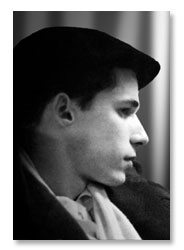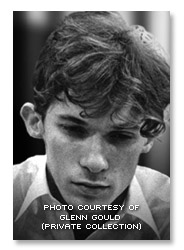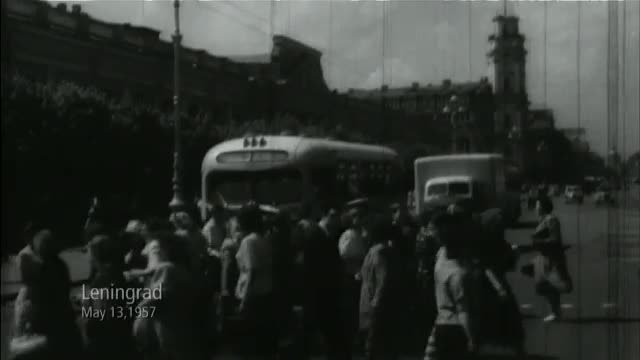


Glenn Gould first studied piano with his mother who was a voice teacher. At ten he went to the Toronto Conservatory of Music where he studied piano with Albert Guerrero, organ with Frederick C. Silvester and theory with Leo Smith. Concurrently, Gould studied at Malvern Collegiate Institute. At fifteen he gave his recital debut in Toronto and within a few years was regularly appearing on Canadian radio and television. Tours of Western Canada followed, and by 1955 Gould, already one of Canada’s outstanding musicians, made his American debut in Washington DC. The recital, consisting of Bach, late Beethoven, Webern and Berg, was repeated in New York whereupon Gould was immediately signed to CBS records. The release of his 1955 recording of Bach’s ‘Goldberg’ Variations BWV 988 spread his name around the world as this was Bach playing of a style that was wholly new.
Gould made his New York orchestral debut with the New York Philharmonic and Leonard Bernstein playing Beethoven’s Piano Concerto No. 2 in B flat Op. 19 and later that year made his debut in Berlin with Herbert von Karajan and the Berlin Philharmonic Orchestra. From 1955 Gould performed regularly throughout North America, and between 1957 and 1959 played in the USSR, Israel and Western Europe. In demand everywhere, he played with the greatest orchestras and conductors until 1964 when he retired from the concert stage. He was only thirty-two, but did not like the experience of concert-giving, finding it traumatic and unpleasant. Gould, increasingly eccentric and always fastidious and particular about his health, found the option of editing a recording to his satisfaction far preferable to performing.
In the remaining eighteen years of his life Gould led an unusual and somewhat reclusive lifestyle. He composed, wrote and broadcast extensively and made a large number of recordings. This was the only way in which the public could now hear him, and he had complete control over what they heard. Many of his recordings are unconventional and Gould’s particular approach to a work can sometimes be irritating. (An example can be found anywhere, but Mozart’s Piano Sonata in A major K. 311 is one such.) But however much one disagrees with what Gould does with the music he is playing, he is always committed and often enlightening, even if sometimes wayward.
Gould recorded for Columbia/CBS from 1955 until his death. In 1992 CBS/Sony began to issue a comprehensive collection of Gould’s studio recordings, films and broadcasts, whilst the Canadian Broadcasting Commission has issued many of Gould’s early broadcasts on their own label. The first LP of Bach’s ‘Goldberg’ Variations BWV 988 made the public eager for more Bach, and he recorded most of the major keyboard works including the partitas, Das wohltemperierte Klavier, toccatas, French Suites, English Suites, two- and three-part inventions as well as many of the concertos. There is no doubt that Gould’s sometimes relentless approach to Bach has influenced other performers of this music for the last fifty years, and continues to do so. A highlight among his Bach recordings is the second version of the ‘Goldberg’ Variations from 1981.
Gould’s style in Bach and Beethoven is often inflexible. He generally preferred to avoid nineteenth-century Romantic music and a radio broadcast of Chopin’s Piano Sonata in B minor Op. 58 shows exactly why: he had no idea about the style of this type of music. Although he recorded works by Beethoven, Haydn and Mozart (including the complete piano sonatas), Gould liked to promote rarely-heard works. He recorded the complete piano sonatas of Hindemith, the complete works of Schoenberg, an album of works by Byrd, Gibbons and Sweelinck, piano sonatas by Grieg and Richard Strauss, and the Variations Chromatiques by Bizet. On a disc of piano works by Sibelius Gould takes ‘knob twiddling’ in the studio to its limit by varying both the perspective of the recorded piano and its distance from the listener. Impressive recordings include those of Prokofiev’s Piano Sonata No. 7 Op. 83 and Scriabin’s Piano Sonatas Nos 3 and 5, as well as a disc of his own Wagner transcriptions in which Gould uses overdubbing in the studio.
Hailed as a genius by some, Gould can still provoke debate through his idiosyncratic recordings. His own collected writings have been published since his death, and many books about him have appeared in various languages including selected letters.
© Naxos Rights International Ltd. — Jonathan Summers (A–Z of Pianists, Naxos 8.558107–10)
| Title | |
| GOULD, Glenn: Russian Journey (The) (Documentary, 2002) | |

|
GOULD, Glenn: Russian Journey (The) (Documentary, 2002)
Artist:
Gould, Glenn
Label/Producer: C Major |
